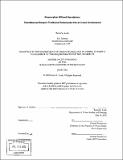Preservation without boundaries : transitioning Bhutan's traditional settlements into an urban environment
Author(s)
Loeb, Rachel L. (Rachel Lauren), 1973-
DownloadFull printable version (48.14Mb)
Other Contributors
Massachusetts Institute of Technology. Dept. of Urban Studies and Planning.
Advisor
Dennis Frenchman.
Terms of use
Metadata
Show full item recordAbstract
The Royal Government of Bhutan requires that all national policies incorporate the promotion and protection of the country's cultural heritage. This thesis connects the Kingdom of Bhutan's cultural heritage agenda with the government's new effort to preserve the twelve traditional settlements in its capital Thimphu. The Royal Government of Bhutan places its unique vision, Gross National Happiness, at the center of its development philosophy. To be consistent policymakers should approach urban growth the same way. Rather than isolate traditional villages in historic districts, the clusters should be placed in the center of new development. The current draft of the city's Structure Plan includes a program to preserve the built vernacular. However, despite ever-increasing efforts by government officials and local citizens alike to protect vernacular building clusters, they continue to disappear. This thesis outlines the factors contributing to their destruction and reconfigures the Thimphu valley's urban design priorities to achieve an alignment of vision and implementation. The title of this thesis "Preservation without Boundaries" emphasizes the fact that multiple conservation approaches are needed in Thimphu reflecting the following key ideas: First, the settlements should not be isolated from new development. The conservation program should celebrate the farmhouses and government officials should learn from their design by making urban growth in Thimphu's valley relate to the original settlement patterns. Second, the most efficient way to guarantee the survival of traditional structures is to provide them with meaning and utility in a modern and urban environment. And third, as the Kingdom's economic resources increase, legal institutions improve and urban development priority change, the conservation planning process must be able to accommodate and advance with unforeseeable change. The Royal Government of Bhutan can conserve Thimphu's traditional settlements if it develops a conservation plan that focuses on the process of design and implementation and not on the end product itself.
Description
Thesis (M.C.P.)--Massachusetts Institute of Technology, Dept. of Urban Studies and Planning, 2002. Includes bibliographical references (p. 111-114).
Date issued
2002Department
Massachusetts Institute of Technology. Department of Urban Studies and PlanningPublisher
Massachusetts Institute of Technology
Keywords
Urban Studies and Planning.